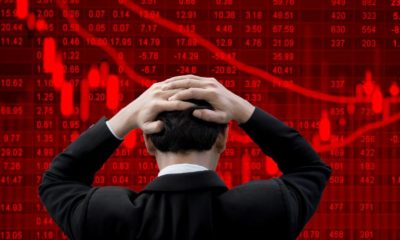Business
Growth VS Value Stocks: Which Will Give You A Return?

A long-standing division
McDonald's and Starbucks both make incredible amounts of money.
What's the difference between them, if any?
Well, some analysts would say that McDonald's should be labeled a value stock.
Conversely, Starbucks would be a growth stock.
Growth stocks are self-explanatory.
They're the ones that are growing like crazy.
Everybody wants in on the action.
Their habitat of choice is the technology industry.
There, you can find an environment rife with speculation to drive up share prices.
Most of the products there are relatively new, meaning no one knows what their limits are.
When things go out of control in the wrong direction, they sometimes call it negative growth.
“People will remember as a stock which grew…right into the ground. Like roots.” Poetic, you might suppose.
[ms_divider style=”normal” align=”left” width=”100%” margin_top=”30″ margin_bottom=”30″ border_size=”5″ border_color=”#f2f2f2″ icon=”” class=”” id=””][/ms_divider]
[ms_featurebox style=”4″ title_font_size=”18″ title_color=”#2b2b2b” icon_circle=”no” icon_size=”46″ title=”Recommended Link” icon=”” alignment=”left” icon_animation_type=”” icon_color=”” icon_background_color=”” icon_border_color=”” icon_border_width=”0″ flip_icon=”none” spinning_icon=”no” icon_image=”” icon_image_width=”0″ icon_image_height=”” link_url=”https://offers.thecapitalist.com/p/warrenbuffet/index” link_target=”_blank” link_text=”Click Here To Find Out What It Said…” link_color=”#4885bf” content_color=”” content_box_background_color=”” class=”” id=””]Warren Buffett Just Told His Heirs What He Wants them To Do With His Fortune When He Dies. [/ms_featurebox]
[ms_divider style=”normal” align=”left” width=”100%” margin_top=”30″ margin_bottom=”30″ border_size=”5″ border_color=”#f2f2f2″ icon=”” class=”” id=””][/ms_divider]
Slow and steady wins the race
In the other corner of the ring, there are the value stocks.
Often, they were the growth stocks of yesterday, but one way or another, their share price has taken a hit. It's the circle of life.
Let's say a viral video popped up of a cute puppy getting a stomachache from a brand of dog food.
After that, this stock gets tossed into the DVD bargain bin alongside last year's B-list romantic comedy.
Whether the value stock is on its way to oblivion or can rebound depends on exactly what dropped the price.
If the scandal was like the puppy and had to do with the real product, you might be in trouble.
A poor choice of words from the CEO, however, is not a deal-breaker. News like that is here today, gone tomorrow.
Hence, tomorrow, it might be nice to own it already.
Don't all the years I've worked here count for anything?
Not to mention, the more stable stocks tend to provide greater dividends.
Remember how in between buying and selling you were pretending to want this thing?
Dividends are the base from which all the stock's value is theoretically derived, in a way.
Maybe they're not growing as fast, but the older, more established corporations are big.
That means bigger checks for shareholders.
Businesses do, in fact, try to become significant for a real reason.
How do you tell one from the other?
Here we turn to the all-powerful price ratio for more information.
That said, good luck figuring that one out.
There are at least five versions of it out there.
Almost all of them appear to be designed to test for growth.
Price-to-sales, at least, is nearly impossible to falsify, as are most things at the rounded top of the income statement.
The further down on that piece of paper the numbers are, the more wiggle room accountants have with them.
The P/S ratio will show growth well.
But if a nuclear crisis in China makes getting safe rice more and more expensive, the takeout restaurant's sales might come at higher supply costs.
Who's cool now?
Growth has been the favored child of these twins up to now.
It's the social instinct, to love what everyone else is buying and fear what they're bailing out.
The crash of '29 was, to one extent or another, a result of people panicking about other people's panic.
And value stocks were at an approximate ten-year low when they made a rebound early this year.
A value portfolio is good for uncertain markets, generally speaking. Can you remember the last time the market was sure?
“Oh, yeah, well…Warren Buffett says that's dumb!”
One of the handful of (sort of) dissenting voices in the mix is Warren Buffett.
And that's because he seems to float loftily above the difference between the two categories to begin.
Reading between the lines of an old report he gave to his company's owners; the Buffet strategy would appear to be trying to merge value and growth concepts.
Speculation says that he specifically dislikes debt-driven growth.
He doesn't want any other form of growth that will spend more now than it can ever make worthwhile in the future.
In other words, he probably wants growth, but like a forest, it has to be sustainably sourced.
Let's put some names to the faces
The following list shows stocks picked either by Buffett's company or by someone who purports to apply the same principles:
- Lubrizol
- Burlington Northern Santa Fe
- FactSet Research Systems
- TJX Companies
- PetSmart
Disclaimer: Always consult a real financial expert. You know, a guy or gal with a degree. Hopefully liability insurance, too.
If you want something done right, do it yourself
If you're thinking of following this up with more research, data shouldn't be hard to find.
Countless websites and programs offer filters which will point out exactly where to find what combination of value/growth traits you want.
Get cracking!















